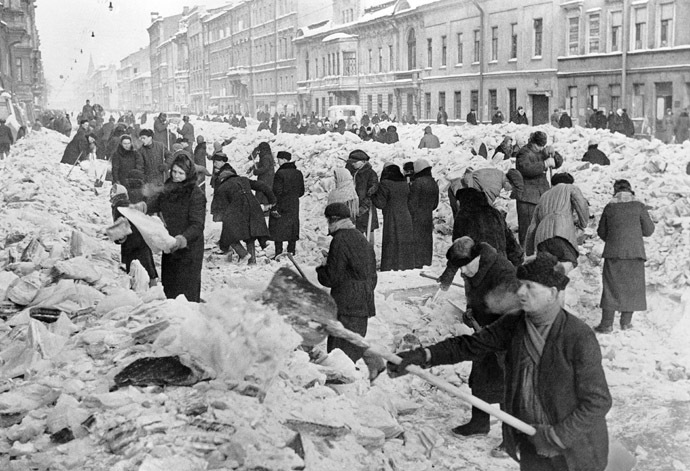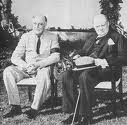January 30, 2014


Granin was 22 when he volunteered to join the Red Army and became a tank officer. He said he enrolled “probably out of pure boyish lust for romance.”
“But the next few days of the war sobered me, like most of my friends. We were bombed out just when our train arrived on the front line, and since then we experienced one defeat after another, so we fled, retreated, then fled again... Finally, somewhere in mid-September, my regiment was forced to surrender the town of Pushkin, the front collapsed and the blockade began. The blockade, which lasted 900 days..."

"Hitler ordered [his troops] not to enter the city to avoid losses in street battles, where tanks were unable to take part. German troops, in fact, quite comfortably and easily, expected that the coming famine and cold would force the city to surrender," Granin said.
"In reality, the war stopped being a war. From the enemy’s side, it gradually turned into an expectation of surrender.”
Indeed, with the heating switched off during the bitterly cold winter at the beginning of the siege, from 1941 to 1942, thousands of residents of the former imperial capital died of hunger and exhaustion each day when rations fell to just 125 grams of bread per person.

Deutsche Welle quoted German President Joachim Gauck as saying that his countrymen and women experienced "profound sorrow and shame" about the actions of the Nazis, who caused the deaths of up to 1 1/2 million people in the siege.
Former Minister of Consumer Protection, Food and Agriculture Renate Künast said that Germans know about the millions who died, but are unaware of the grief that the civilians experienced. The politician, from the Green Party, said that the Germans can hardly fully imagine all the meanness of WWII, and need to speak about it with the younger generation.

Our views are far apart’: German chancellor slams US, UK over spying, January 29, 2014
"But does that make it right for our closest allies, like the United States or Britain, to access all imaginable data - arguing that it helps their own security and that of their partners?" Chancellor Angela Merkel told the Parliament in the first major policy speech of her third term.
Merkel, who herself was a target of US eavesdropping on her personal phone calls, warned that using “everything that is technically do-able" to obtain information leads to mistrust between allies, which would eventually undermine their mutual security.
The US, however, says its surveillance practices are focused on threats to national security, including terrorism. In its recent interview, US President Barack Obama assured Merkel that she does not need to worry about NSA surveillance, even though the Agency would continue surveillance on foreign governments.
"Can it be right that it's not just about defending against terrorist threats but also to gain advantage over their allies, for example, in negotiations at G20 summits or UN sessions?""Our answer can only be: 'No, that cannot be right'."
Merkel is set to meet with US Secretary of State John Kerry in Berlin on Friday to discuss "on the transatlantic partnership and global political issues". The NSA and its surveillance practices are expected to be on the agenda.
“Our views are today far apart," Merkel said.
Get short URL <<
Hitler’s Failed Blitzkrieg against the Soviet Union. The “Battle of Moscow” and Stalingrad: Turning Point of World War II
The victory of the Red Army in front of Moscow was a major break... By Dr. Jacques R. Pauwels
Historian Dr. Jacques Pauwels analyses the evolution of World War II, focussing on the “Battle of Moscow” in December 1941 which preceeded the defeat of German troops in Stalingrad in February 1943. According to Dr. Pauwels, the turning point was not Stalingrad but “the Battle of Moscow” and the Soviet counter-offensive launched in December 1941:
When the Red Army launched its devastating counteroffensive on December 5, Hitler himself realized that he would lose the war. But of course he was not prepared to let the German public know that. The nasty tidings from the front near Moscow were presented to the public as a temporary setback, blamed on the supposedly unexpectedly early arrival of winter and/or on the incompetence or cowardice of certain commanders.
The tide of the war in the east turned gradually, but it did not do so imperceptibly. Already in August 1941, as the German successes failed to bring about a Soviet capitulation and the Wehrmacht’s advance slowed down considerably, astute observers started to doubt that a German victory, not only in the Soviet Union but in the war in general, still belonged to the realm of possibilities. The well-informed Vatican, for example, initially very enthusiastic about Hitler’s “crusade” against the Soviet homeland of “godless” Bolshevism and confident that the Soviets would collapse immediately, started to express grave concerns about the situation in the east in late summer 1941; by mid-October, it was to come to the conclusion that Germany would lose the war.[27] Likewise in mid-October, the Swiss secret services reported that “the Germans can no longer win the war”; that conclusion was based on information gathered in Sweden from statements by visiting German officers.[28] By late November, a defeatism of sorts had started to infect the higher ranks of the Wehrmacht and of the Nazi Party. Even as they were urging their troops forward towards Moscow, some generals opined that it would be preferable to make peace overtures and wind down the war without achieving the great victory that had seemed so certain at the start of Operation Barbarossa. And shortly before the end of November, Armament Minister Fritz Todt asked Hitler to find a diplomatic way out of the war, since purely militarily as well as industrially it was as good as lost.[29]
When the Red Army launched its devastating counteroffensive on December 5, Hitler himself realized that he would lose the war. But of course he was not prepared to let the German public know that. The nasty tidings from the front near Moscow were presented to the public as a temporary setback, blamed on the supposedly unexpectedly early arrival of winter and/or on the incompetence or cowardice of certain commanders. (It was only a good year later, after the catastrophic defeat in the Battle of Stalingrad during the winter of 1942-1943, that the German public, and the entire world, would realize that Germany was doomed; this is why even today many historians believe that the tide turned in Stalingrad .) Even so, it proved impossible to keep the catastrophic implications of the debacle in front of Moscow a total secret. For example, on December 19, 1941, the German Consul in Basel reported to his superiors in Berlin that the (openly pro-Nazi) head of a mission of the Swiss Red Cross, sent to the front in the Soviet Union to assist only the wounded on the German side, which of course contravened Red Cross rules, had returned to Switzerland with the news, most surprising to the Consul, that “he no longer believed that Germany could win the war.”[30]
December 7. 1941. In his headquarters deep in the forests of East Prussia, Hitler had not yet fully digested the ominous news of the Soviet counter-offensive in front of Moscow, when he learned that, on the other side of the world, the Japanese had attacked the Americans at Pearl Harbour. This caused the US to declare war on Japan, but not on Germany, which had nothing to do with the attack and had not even been aware of the Japanese plans. Hitler had no obligation whatsoever to rush to the aid of his Japanese friends, as is claimed by many American historians, but on December 11, 1941 – four days after Pearl Harbor – he declared war on the US. This seemingly irrational decision must be understood in light of the German predicament in the Soviet Union. Hitler almost certainly speculated that this entirely gratuitous gesture of solidarity would induce his Eastern ally to reciprocate with a declaration of war on the enemy of Germany, the Soviet Union, and this would have forced the Soviets into the extremely perilous predicament of a two-front war. Hitler appears to have believed that he could exorcize the spectre of defeat in the Soviet Union, and in the war in general, by summoning a sort of Japanese deus ex machina to the Soviet Union’s vulnerable Siberian frontier. According to the German historian Hans W. Gatzke, the Führer was convinced that “if Germany failed to join Japan [in the war against the United States], it would…end all hope for Japanese help against the Soviet Union.” But Japan did not take Hitler’s bait. Tokyo, too, despised the Soviet state, but the land of the rising sun, now at war against the US, could afford the luxury of a two-front war as little as the Soviets, and preferred to put all of its money on a “southern” strategy, hoping to win the big prize of Southeast Asia – including oil-rich Indonesia! -, rather than embark on a venture in the inhospitable reaches of Siberia. Only at the very end of the war, after the surrender of Nazi Germany, would it come to hostilities between the Soviet Union and Japan. [31]
>> http://www.globalresearch.ca/70-years-ago-december-1941-turning-point-of-world-war-ii/28059
Ukraine: Foreign Engineered Regime Change Operation
The situation in Ukraine is a fluid one and changing by the hour. Although it had appeared that there was a resolution to the protests that had broken out after the government of Ukraine had made the sovereign decision of sticking with Russia and saying no to closer European Union integration, excessive violence from the western backed opposition has spread like a wave throughout the country.
The so called Ukrainian “opposition” now resembles something more akin to armed insurgents in Syria involved in a coup d’état than opposition protestors.
The situation in Ukraine once again underlines US hypocrisy. The US, which prides itself on protecting its police, supports an “opposition” which is threatening, attacking, kidnapping and setting young police officers on fire. The scene currently playing out in Ukraine has all of the signs of a foreign engineered regime change operation and with the taking of government buildings, has unarguably moved into a scenario where the continuity of the state is in question.
Voice of Russia regular and NATO expert Rick Rozoff discussed all of these issues and more as the situation threatens to spin out of control.
>> http://www.globalresearch.ca/ukraine-foreign-engineered-regime-change-operation/5366760
Political Doublespeak: State of the Union Or State Of Obama?
The State of the Union, the annual presidential projection of power enjoys a special status because it showcases the prowess of the incumbent to weave a self-congratulatory narrative before what is in effect a peanut galley to cheer him on. Widely understood is that the Congress is at a new low in public approval.
>> http://www.globalresearch.ca/political-doublespeak-state-of-the-union-or-state-of-obama/5366744
The Post War II New World Order Map: A Proposal to Re-arrange the World after an Allied Victory
Revealed By Irish Historian Thomas Moriarty By Maurice Gomberg Global Research, January 30, 2014, Global Research 12 June 2010
At the core of the NWO, however, is always the notion that a small group of powerful individuals, institutions, industries and/or nations must lead the world in the right direction (i.e. towards ‘unification’). This may be against the world’s own will (and therefore done covertly, at least in some versions of the NWO-story), but ultimately it is for its own good.

One of the most recent references to the NWO by a major political figure was made by US president George Bush (Sr), who explicitly used the NWO to refer to US objectives in a Post-Cold War world. The term has a pedigree much older than the Cold War, or even both World Wars. Some might even say – and now we’re straying somewhat prematurely into the field of conspiracy theory – that it goes all the way back to Roman times, as is attested by the (modified) quote of the Roman poet Virgil on the revers of the US Great Seal and (significantly or not, since 1935) on the back of the dollar bill: Novus Ordo Seclorum – literally: ‘A New Order for the Ages’.
http://www.globalresearch.ca/the-post-war-ii-new-world-order-map-a-proposal-to-re-arrange-the-world-after-an-allied-victory/19706 <<
 Enough Is Enough: Fraud-ridden Banks Are Not California’s Only Option By Ellen Brown Global Research, January 30, 2014 Web of Debt
Enough Is Enough: Fraud-ridden Banks Are Not California’s Only Option By Ellen Brown Global Research, January 30, 2014 Web of Debt
So why, asks Chicago Alderwoman Leslie Hairston, are we still doing business with them? She plans to introduce a city council ordinance deleting JPM from the city’s list of designated municipal depositories. As quoted in the January 14th Chicago Sun-Times:
The bank has violated the city code by making admissions of dishonesty and deceit in the way they dealt with their investors in the mortgage securities and Bernie Madoff Ponzi scandals. . . . We use this code against city contractors and all the small companies, why wouldn’t we use this against one of the largest banks in the world?A similar move has been recommended for the City of Los Angeles by L.A. City Councilman Gil Cedillo. But in a January 19th editorial titled “There’s No Profit in L A. Bashing JPMorgan Chase,” the L.A. Times editorial board warned against pulling the city’s money out of JPM and other mega-banks – even though the city attorney is suing them for allegedly causing an epidemic of foreclosures in minority neighborhoods.
“L.A. relies on these banks,” says The Times, “for long-term financing to build bridges and restore lakes, and for short-term financing to pay the bills.” The editorial noted that a similar proposal brought in the fall of 2011 by then-Councilman Richard Alarcon, backed by Occupy L.A., was abandoned because it would have resulted in termination fees and higher interest payments by the city.
It seems we must bow to our oppressors because we have no viable alternative – or do we? What if there is an alternative that would not only save the city money but would be a safer place to deposit its funds than in Wall Street banks?
The Tiny State That Broke Free
>> http://www.globalresearch.ca/enough-is-enough-fraud-ridden-banks-are-not-californias-only-option/5366715
[sidebar: We can manufacture the digital units to run the country, each and every state, municipal, county, city, and name where the computer can't digitally produce the VIRTUAL CREDIT to then take care of humans and stop the CRIMINALLY INSANE WAR HOMICIDAL MANIACAL MONSTERS from killing our own species. Enlightened US Constitutional idea in 2014, too!?]




Look how FRAUD works. Defraud the MONEY and then the insanity grows the human being into cannibals that are not other than criminally insane and made that way due to the so called "BANKS'" FRAUD. Humans aren't as stupid as what appears and then there is the reality INTERNET has exposed the worst of our species and now the time is to get these CREATURES into some place to stop harming self and others!
ReplyDeleteHeinz Kissinger and his GOLDEN ARMY doing people as though useless eaters, see the TEEN who is being sled drawn by an old woman in Russia, that is a KISSINGER dream com true cause Kissinger & Associates (Tim Geithner Et Al) are VILE EVIL
ReplyDelete